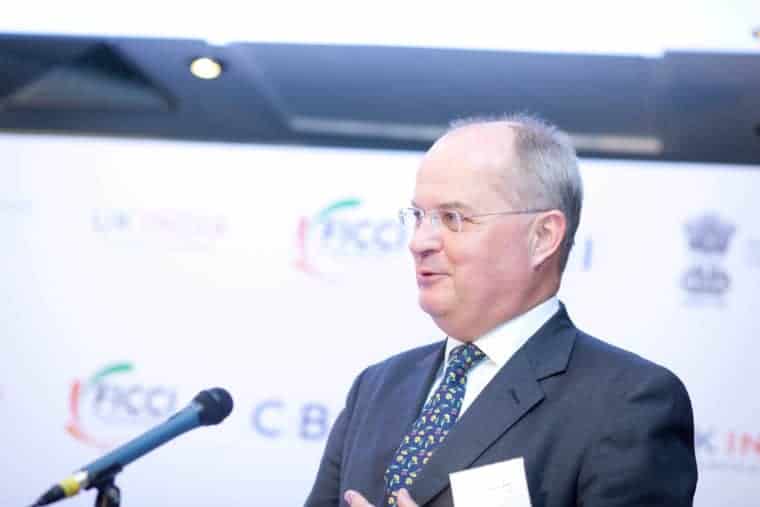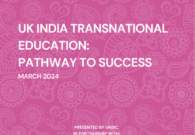Richard Heald: CEO’s March 2017 newsletter
UK INDIA BUSINESS COUNCIL CEO RICHARD HEALD GIVES HIS TAKE ON DEVELOPMENTS IN THE UK-INDIA RELATIONSHIP OVER THE PAST MONTH, LOOKING FORWARD TO THE MONTHS AHEAD

Admittedly, the next Indian general election will not be held until Q2 2019, however the announcement, on Sunday, 11th March, of the result of the Uttar Pradesh state elections will effectively see the starting gun fired for next general – Lok Sabha – election in India.
And the outcome of this State election will set the tone over the next 24 months. With the most recent polls in the state showing an uncertain outcome, the tempo and rhetoric into the announcement is getting more febrile.
True, Uttar Pradesh (UP) is but one of 5 state elections which are currently taking place, the others being Uttarakhand, Goa, Punjab, and Manipur, but the impact of that UP election is of huge importance. With a population of some 200 million inhabitants and an electorate of 140 million people, the UP result will have a profound impact within the State and nationally by dint of the influence the 403 elected legislators will have on the composition of the Rajya Sabha, the all-important national upper legislative chamber where Prime Minister Modi does not currently enjoy a majority. In addition and critically, the result is widely seen as being a harbinger as to how the ruling NDA coalition will act over the remaining 2 years of this Parliament.
Last week, UK India Business Council led an event at which Finance Minister Arun Jaitley was interviewed by James Kynge of the Financial Times. The first question that Mr. Jaitley was asked was what further reforms we could expect into the next Union elections. Unsurprisingly, Mr. Jaitley avoided answering the question. Indian watchers predict that if the result in Uttar Pradesh does not favour the BJP party then there will be less emphasis on structural reforms, and as a result, more populist measures will be seen in the coming months – a probable cabinet reshuffle notwithstanding.
Predicting state elections in India is rather like attempting to hit the “treble twenty” on a dart board in a darkened room. And no more so than in Uttar Pradesh, which is a state of such size and complexity that it is practically impossible to determine the trends within the vast electorate. In the 2014 general election, Prime Minister Modi and the BJP/ NDA coalition swept to absolute majority nationally on the back of a 42% vote across Uttar Pradesh – capturing some 72 UP seats in the Lok Sabha out of a possible 80. Expectations are raised very high. But state elections are very different from national elections and competition is intense from the ruling Samajwadi party which has allied with Congress, as well as from the BSP led by the redoubtable Mayawati.
From a business point of view, a poor result for the BJP – and one can argue what “poor” looks like – could have an immediate and profound impact on the political dynamics in Delhi. Just last week, economic numbers were published by the Central Statistics Office (CSO). The economy posted Q4 GDP growth of 7.0% indicating that it was more robust than many had expected – particularly after the short-term disruptions caused by the demonetisation of November last year. These numbers were met with some scepticism. Nonetheless, the impact of the disruption caused by the demonetisation is proving complicated to discern. At the same time, there are still a large number of issues which need to be resolved before the all-important Goods and Sales Tax (GST) is introduced. In our Budget submission – to the Minister Jaitley – effective and efficient introduction of free flow of goods and services across India is the top “ask” of the 80 or so responding UK companies.
It is important that the Government does not let up on its drive to improve the “Ease of Doing Business.” Of course, the increased transparency in business and financial dealings caused by the combined effect of demonetisation and of the introduction of GST cannot be underestimated. At the same time, Minister Jaitley showed his intent by announcing the abolition of the Foreign Investment Promotion Board (FIPB) last month in his Union Budget. This removes at a stroke government intervention in the flows of Foreign Direct Investments (FDI). In practice, over the years, the increasing liberalisation of the country’s FDI regime has resulted in more and more FDI through the “automatic” route. Nonetheless, the formal removal of the bureaucrats’ discretionary powers is a major public declaration of confidence.
The government has also announced that it will grant Permanent Resident Status (PRS) to foreign investors who meet some set criteria in terms on amount of investment and employment. PRS will be granted at first for 10 years, with multiple entry, and could be extended for a further 10 years. Moreover, PRS status will also give the right to purchase and use one residential property.
Minister Jaitley has clearly set the government’s sights on increasing the flows of FDI into India. And while, the levels of inbound investment have been improving year on year, significantly more investment is required to meet the important infrastructure and economic imperatives which underpin India’s continued growth.
This all positive. But the Government has to continue to strive to make the operating environment competitive – in an increasingly competitive world. The UK India Business Council was hoping to see more positive action on reduction in the general levels of Corporation Tax and on Dividend Distribution Tax.
Minister Jaitley was asked about this at the Financial Times interview. He noted that Corporation Tax minus surcharges was some 30% and taking into account exemptions, both geographical and sectoral, big corporates ended up paying less 25% and smaller businesses were playing in excess of 30%. The policy and ambition of the Indian Government is to make the Corporation Tax environment globally competitive, bringing it down to 25% for all companies and removing all exemptions. At the same time, Mr. Jaitley was frank in relation to his ability to reduce Dividend Distribution Tax – currently 15%
“Once we are able to expand the tax base, my ability to rationalise taxes will increase. Currently, the compliant taxpayer not only pays for himself, but also for the non-compliant. Once I get the non-compliant taxpayer into the net my ability – to reduce the tax burden – will increase. There are three steps to this – GST, demonetisation, which will squeeze the quantum of currency, and cash expenditure – we will put ceilings on this. All three taken together will change the expenditure habits.”
March 2017 should see the triggering of Article 50 and the start of the process of negotiation after which the UK will exit the European Union. Much debate continues around what this means for the economic relationship with India and also the likelihood of the UK and India concluding a Comprehensive Economic Partnership Agreement (CEPA). In practice, we do not see any foreseeable impact. Formal discussions on a CEPA will not commence for some years. However, two things remain constant: – first, the UK and India remain major economic partners. Last month CBI supported by UKIBC ad PwC published the 2nd annual Sterling Assets Report which underscored the impact that the 600 or so UK companies in India continue to make to the Indian economic story. The UK remains the largest G20 FDI investor, the largest source of direct and indirect source of FII flows into India; an employer of near 800,000 people or every 1 person in 20 in the organised sector.
And all the signs indicate that this involvement will continue to grow. The UK India Business Council is increasingly engaged advising UK and Indian companies in bilateral investments and trade.
Indeed, the UK India Business Council believes that the inherent attractiveness and stage of development of the Indian economy means that UK businesses will increasingly wish to interact with India. Trade tariffs are a known cost; non-trade barriers remain work in progress.
In the meantime, secondly, there remains the need to maintain investment confidence. In this, continuity of the Bilateral Investment Treaty (BIT) remains crucial. UK business wants to see continuity of existing arrangements until a new treaty is negotiated post Brexit. Being grandfathered into an arrangement agreed with the EU member states, post the triggering of Article 50, is illogical. Clarity here would be welcomed.
However, we remain confident that bilateral economic relations will continue to prosper though the continued efforts of business, and the UK India Business Council continues to look forward to playing its part.
Richard Heald is UK India Business Council’s CEO







